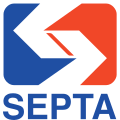
Back Southeastern Pennsylvania Transportation Authority German Autoridad de Transporte del Sureste de Pensilvania Spanish Filadelfiako metroa Basque سازمان ترابری جنوب شرقی پنسیلوانیا Persian SEPTA Finnish Southeastern Pennsylvania Transportation Authority French 南東ペンシルベニア交通局 Japanese SEPTA Korean Southeastern Pennsylvania Transportation Authority Dutch Транспортное управление по юго-востоку Пенсильвании Russian
| Southeastern Pennsylvania Transportation Authority (SEPTA) | |||
|---|---|---|---|
 | |||
| Overview | |||
| Area served | Philadelphia and the surrounding regions in Pennsylvania, as well as limited services in New Castle County, Delaware and Mercer County, New Jersey | ||
| Locale | Delaware Valley | ||
| Transit type | |||
| Number of lines | 196 | ||
| Number of stations | 290 | ||
| Daily ridership | 768,600 (weekdays, Q4 2024)[1] | ||
| Annual ridership | 223.5 million (2020)[2] | ||
| Chief executive | Scott Sauer (Interim General Manager) | ||
| Headquarters | 1234 Market Street, Philadelphia, Pennsylvania, U.S. | ||
| Website | septa.org | ||
| Operation | |||
| Began operation | November 1, 1965 | ||
| Number of vehicles | 2,897 (2018)[4] | ||
| |||
SEPTA, the Southeastern Pennsylvania Transportation Authority, is a regional public transportation authority[5] that operates bus, rapid transit, commuter rail, light rail, and electric trolleybus services for nearly four million people throughout five counties in and around Philadelphia, Pennsylvania. It also manages projects that maintain, replace, and expand its infrastructure, facilities, and vehicles.
SEPTA is the major transit provider for Philadelphia and four surrounding counties within the Philadelphia metropolitan area, including Delaware, Montgomery, Bucks, and Chester counties. It is a state-created authority, with the majority of its board appointed by the five counties it serves.[6] Several SEPTA commuter rail and bus services serve New Castle County, Delaware and Mercer County, New Jersey, although service to Philadelphia from South Jersey is provided by the PATCO Speedline, which is run by the Delaware River Port Authority, a bi-state agency, and NJ Transit, which operates many bus lines and a commuter rail line to Philadelphia.
SEPTA has the sixth-largest U.S. rapid transit system in the nation by ridership, and the fifth-largest overall transit system in the nation, with about 302 million annual unlinked trips as of 2018.[7] It controls 290 active stations, over 450 miles (720 km) of track, 2,350 revenue vehicles, and 196 routes.[8] It also oversees shared-ride services in Philadelphia and ADA services across the region, which are operated by third-party contractors, Amtrak, and NJ Transit.
SEPTA is the only U.S. transit authority that operates all five major types of terrestrial transit vehicles: regional commuter rail trains, rapid transit subway and elevated trains, light rail trolleys, trolleybuses, and motorbuses. This title was shared with Boston's Massachusetts Bay Transportation Authority, which also ran ferryboat service, until trolleybuses in Greater Boston were discontinued in 2023, leaving SEPTA as the sole remaining U.S. transit authority operating all five terrestrial transit vehicle types.[9]
- ^ "Transit Ridership Report Third Quarter 2024" (PDF). American Public Transportation Association. November 20, 2024. Retrieved November 23, 2024.
- ^ Cite error: The named reference
Fiscal Year 2021 Operating Budgetwas invoked but never defined (see the help page). - ^ a b "SEPTA | Board Members". www.septa.org. June 16, 2023.
- ^ "Southeastern Pennsylvania Transportation Authority 2018 Agency Profile" (PDF). FTA National Transit Database (NTD). December 13, 2019. p. 1. Archived from the original (PDF) on May 22, 2021. Retrieved September 27, 2020.
- ^ "SEPTA Enabling Legislation (74PaCS§ 1711)". Pennsylvania Legis website.
- ^ Cite error: The named reference
crisiswas invoked but never defined (see the help page). - ^ "SEPTA Operating Facts Fiscal Year 2018" (PDF). SEPTA. 2019.
- ^ "Testimony of Thomas J. Nestel, III, Chief of Transit Police, Southeastern Pennsylvania Transportation Authority (SEPTA), Philadelphia, PA, before the House Committee on Homeland Security Subcommittee on Transportation and Protective Security "Securing Public Areas of Transportation Systems: Stakeholder Perspectives"" (PDF). docs.house.gov. November 28, 2017.
- ^ "SEPTA Facts". SEPTA. Archived from the original on May 9, 2008.
© MMXXIII Rich X Search. We shall prevail. All rights reserved. Rich X Search
